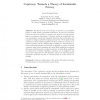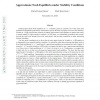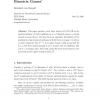134
Voted
FORMATS
2010
Springer
14 years 11 months ago
2010
Springer
We study two-player timed games where the objectives of the two players are not opposite. We focus on the standard notion of Nash equilibrium and propose a series of transformation...
87
Voted
FOCS
2010
IEEE
14 years 11 months ago
2010
IEEE
Generalized Second Price Auction, also knows as Ad Word auctions, and its variants has been the main mechanism used by search companies to auction positions for sponsored search l...
113
Voted
TCS
2010
14 years 11 months ago
2010
Abstract. We study a general class of non-cooperative games coming from combinatorial covering and facility location problems. A game for k players is based on an integer programmi...
SIAMCOMP
2010
14 years 11 months ago
2010
Designing and deploying a network protocol determines the rules by which end users interact with each other and with the network. We consider the problem of designing a protocol t...
106
Voted
SAGT
2010
Springer
14 years 11 months ago
2010
Springer
Can learning algorithms find a Nash equilibrium? This is a natural question for several reasons. Learning algorithms resemble the behavior of players in many naturally arising gam...
98
Voted
PSD
2010
Springer
14 years 11 months ago
2010
Springer
We introduce the novel concept of coprivacy or co-operative privacy to make privacy preservation attractive. A protocol is coprivate if the best option for a player to preserve her...
84
Voted
MSS
2010
IEEE
14 years 11 months ago
2010
IEEE
We consider four different game-theoretic approaches to describe the formation of social networks under mutual consent and costly communication. First, we consider Jackson-Wolins...
108
Voted
MOR
2010
14 years 11 months ago
2010
We develop first-order smoothing techniques for saddle-point problems that arise in the Nash equilibria computation of sequential games. The crux of our work is a construction of ...
97
Voted
CORR
2010
Springer
14 years 11 months ago
2010
Springer
Finding approximate Nash equilibria in n × n bimatrix games is currently one of the main open problems in algorithmic game theory. Motivated in part by the lack of progress on wo...
99
Voted
DCG
1999
15 years 24 days ago
1999
This paper presents a new lower bound of 2:414d= p d on the maximal number of Nash equilibria in d d bimatrix games, a central concept in game theory. The proof uses an equivalent ...






